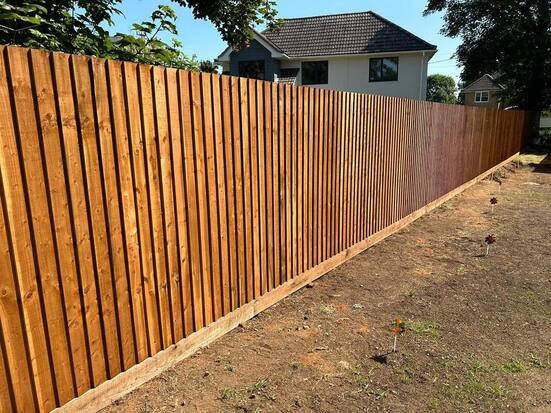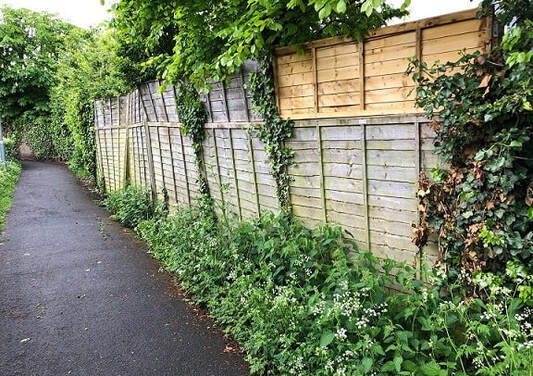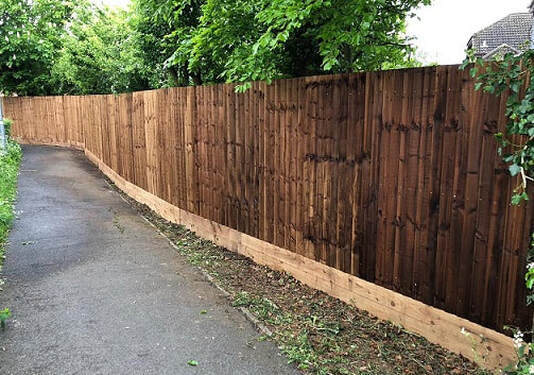|
Creating a beautiful garden space involves more than just planting flowers and tending to greenery. A well-designed garden fence can not only enhance the aesthetics of your outdoor space but also serve essential practical purposes. From protecting your plants, to adding privacy and defining boundaries, a garden fence is a valuable addition to any landscape. In this blog post, we'll explore various types of garden fencing options, such as wooden, metal, and bamboo, and provide valuable insights to help you choose the perfect fence that complements your garden's style and fulfils its purpose. Wooden fencesWooden fences exude timeless charm and can seamlessly blend into any garden setting. They come in a wide range of styles, from classic picket fences, to rustic split-rail designs. The natural appeal of wood complements the greenery, creating a harmonious and inviting atmosphere. For a more modern touch, consider horizontal slat fencing, which adds a contemporary flair to traditional materials. Wooden fences can offer varying degrees of privacy, depending on the design and spacing between the boards. Cedar and redwood are popular wood choices for their durability and resistance to decay. Key factors to consider
Composite fencesComposite fencing, such as Durapost, has gained popularity for its exceptional durability and minimal maintenance requirements. It's available in various styles, including picket, privacy, and decorative lattice designs. Composite fences are resistant to rot, insects, and weather damage, making them a suitable choice for long-lasting garden boundaries. Key factors to consider
Metal fencesMetal fences, such as wrought iron, add a touch of elegance and sophistication to any garden. These fences are known for their durability and longevity, making them a wise investment. Wrought iron fences often feature intricate designs and can be customised to suit your garden's unique aesthetics. Key factors to consider
Bamboo fencesBamboo fences bring a touch of Zen to your garden while offering eco-friendly and sustainable advantages. Bamboo is a fast-growing, renewable resource that can add a tropical or Asian-inspired ambiance to your outdoor space. Bamboo screens are also available for added privacy and can be easily installed against existing walls or fences.
Key factors to consider
Selecting the ideal garden fence involves carefully considering your garden's unique needs, style, and your personal preferences. Whether you opt for the timeless charm of wooden fences, the elegance of metal, or the natural appeal of bamboo, the right garden fence will not only enhance the beauty of your outdoor space but also protect and define it for years to come. Embrace your creativity and make an informed decision to create a garden retreat that truly reflects your vision and love for nature.
0 Comments
The summer season brings vibrant colours, blooming flowers, and abundant growth to our gardens. It's the perfect time to enjoy the outdoors and showcase the beauty of your landscape. To help you maintain a stunning garden throughout the summer, we've gathered some essential seasonal landscaping tips. From proper watering techniques to pest control strategies, these tips will ensure your garden remains healthy and vibrant during the warmest months of the year.
Hydration is key In the scorching heat of summer, proper watering becomes crucial for the health of your plants. Early morning or late evening is the best time to water, minimising evaporation. Remember to focus on the base of the plants rather than wetting the foliage, as wet leaves can lead to fungal diseases. Mulching for moisture retention Applying a layer of organic mulch around your plants is an excellent practice to retain soil moisture during the hot summer months. Mulch acts as a protective barrier, preventing evaporation and weed growth while maintaining a cooler root zone. Use organic materials like wood chips, straw, or shredded bark for optimal results. Regular pruning and deadheading To keep your garden looking tidy and promote continuous blooming, regular pruning and deadheading are essential. Remove spent flowers, faded blooms, and damaged foliage to encourage new growth and prevent your plants from expending energy on seed production. Prune any overgrown branches or unwanted growth to maintain the desired shape and structure of your plants. Pest control measures Summer brings with it an array of pests, such as aphids, caterpillars, and beetles, that can damage your garden. Consider implementing natural pest control methods like companion planting, where certain plants repel pests or attract beneficial insects. Regular inspection and handpicking of pests can also help prevent infestations. If necessary, use organic insecticides as a last resort. Fertilising for optimal growth During the summer, plants are actively growing and require additional nutrients to thrive. Apply a balanced, slow-release fertiliser to provide essential minerals and promote healthy growth. Follow the instructions on the fertiliser packaging and avoid overfeeding, as it can lead to excessive foliage growth at the expense of blooms. Protecting from extreme heat High temperatures can be stressful for plants, especially delicate flowers and young seedlings. Provide shade cloth or temporary coverings to shield vulnerable plants from direct sunlight during the hottest parts of the day. Proper mulching and regular watering will also help maintain a cooler soil temperature and reduce heat stress. Stay vigilant for weeds Weeds are notorious for competing with your desired plants for resources and can quickly take over your garden if left unchecked. Regularly inspect your garden for weeds and remove them promptly to prevent them from establishing deep roots. Mulching can also help suppress weed growth and reduce the need for constant weeding. By following these seasonal landscaping tips, you can ensure that your garden remains healthy throughout the summer. Proper watering, mulching, pruning, pest control, and fertilising are the key practices to maintain a beautiful and healthy garden. Embrace the warm weather and enjoy the time in your garden! What was the customer looking to achieve?This customer had a large stretch of fence that had seen better days with lots of ivy and shrubbery growing on it. It was unstable, and as it backed onto a footpath, if the fence fell down it would cause real issues. The fence also curved as it moved along the footpath, meaning the M Evans Landscapes team had to incorporate this into the fence planning and installation to ensure it kept to this boundary. The M Evans SolutionThe team removed the old fence along with the shrubbery and disposed of all the waste. They then installed a brand new closeboard wooden fence with wooden gravel boards to create a sturdy and smart new fence. The OutcomeAre there other fence options?Absolutely! We installed a closeboard fence with wooden gravel boards as this was appropriate for the needs of this customer, however there are many other options. Take a look at our fencing services to see the full range of fencing options we provide. If you have any landscaping needs, contact us today for a free quote. Author - M Evans Landscapes
M Evans Landscapes provide advice and support on all areas of landscaping plus fence repair, fence replacement, and garden maintenance. We believe in quality and transparent work, and are on a mission to transform the landscaping industry to better serve customers to get their gardens looking their best! |




